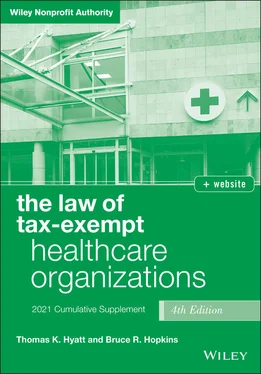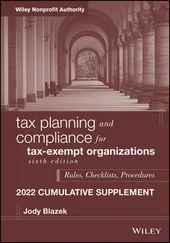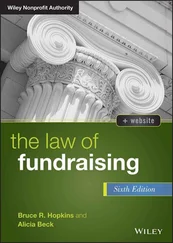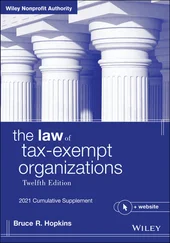Bruce R. Hopkins - The Law of Tax-Exempt Healthcare Organizations
Здесь есть возможность читать онлайн «Bruce R. Hopkins - The Law of Tax-Exempt Healthcare Organizations» — ознакомительный отрывок электронной книги совершенно бесплатно, а после прочтения отрывка купить полную версию. В некоторых случаях можно слушать аудио, скачать через торрент в формате fb2 и присутствует краткое содержание. Жанр: unrecognised, на английском языке. Описание произведения, (предисловие) а так же отзывы посетителей доступны на портале библиотеки ЛибКат.
- Название:The Law of Tax-Exempt Healthcare Organizations
- Автор:
- Жанр:
- Год:неизвестен
- ISBN:нет данных
- Рейтинг книги:4 / 5. Голосов: 1
-
Избранное:Добавить в избранное
- Отзывы:
-
Ваша оценка:
- 80
- 1
- 2
- 3
- 4
- 5
The Law of Tax-Exempt Healthcare Organizations: краткое содержание, описание и аннотация
Предлагаем к чтению аннотацию, описание, краткое содержание или предисловие (зависит от того, что написал сам автор книги «The Law of Tax-Exempt Healthcare Organizations»). Если вы не нашли необходимую информацию о книге — напишите в комментариях, мы постараемся отыскать её.
The Law of Tax-Exempt Healthcare Organizations — читать онлайн ознакомительный отрывок
Ниже представлен текст книги, разбитый по страницам. Система сохранения места последней прочитанной страницы, позволяет с удобством читать онлайн бесплатно книгу «The Law of Tax-Exempt Healthcare Organizations», без необходимости каждый раз заново искать на чём Вы остановились. Поставьте закладку, и сможете в любой момент перейти на страницу, на которой закончили чтение.
Интервал:
Закладка:
The IRS determined that the organization does not meet the operational test because a substantial part of its activities does not further exempt purposes. In its view, the organization created, maintained, developed, promoted, and provided governance and direction to the development of blockchain technology as a commercial enterprise. The IRS concluded that providing blockchain technology to payers, providers, and financial institutions for use in the conduct of their businesses is not educational within the meaning of the Code. It found that the organization operated in a manner similar to a trade or business primarily carried on for profit and that its services were not inherently charitable.
The IRS has also found that an organization that provides a menu of services to healthcare companies does not qualify as a tax‐exempt charitable organization. The services comprised billing, legal, accounting, human resources, personnel, and support staffing. It also provided spiritual, emotional, and physical support services to patients. All of the organization's revenue came from billing and managerial services. The IRS found that the organization failed to satisfy the organizational test for qualification as a charitable organization because its governing documents do not limit its purposes to one or more exempt purposes. It found that the organization was very similar to an organization that did not qualify for tax exemption because providing services to other exempt organizations at cost is not sufficient to characterize the activity as charitable due to the lack of a donative element. The organization's primary activities, which included managing the administrative and medical services of a for‐profit entity for a fee, do not fulfill a charitable educational or religious purpose and they directly compete with other providers of similar services.
In another ruling decided in accordance with the commerciality doctrine, the IRS revoked charitable tax‐exempt status for an organization that provides medical equipment and supplies to patients in their homes. 111.6 The organization leases or sells medical equipment including walkers, wheelchairs, and oxygen. The home medical equipment is designed to assist patients discharged from hospitals who need continuous care. Amounts charged for those services are subject to the patient's ability to pay. The organization's primary source of income is the sale and rental of durable medical equipment (DME) to the general public. It does not receive any grants or donations. The amounts charged to non‐charity patients for the DME are competitive market prices to keep the organization competitive with other DME providers. There are no price caps for retail products, and the organization does not provide items at or below cost. The IRS decided that exemption should be revoked because the organization has substantial nonexempt activity and is operating in a commercial manner. The financial assistance provided to customers by the organization constituted a small amount of the organization's activities. The organization's major activity is the sale and rental of DME to the public at competitive commercial prices. The IRS concluded that providing healthcare services by selling and renting durable medical equipment at commercial prices is not a charitable activity.
In a ruling regarding health food, the IRS denied reinstatement of its prior recognition of charitable tax‐exempt status for an organization that encouraged individuals to engage in “self‐healing” but that actually operated a healthy food restaurant open to the general public in direct competition with other restaurants. 111.7 The IRS relied upon the commerciality doctrine for determining that the organization was not operated exclusively in furtherance of an exempt purpose.
In a similar ruling, a nonprofit organization sought recognition of charitable tax‐exempt status for its proposed operation of a grocery store within an urban area USDA “food desert” that would provide residents with walkable access to affordable and nutritious foods to be sold at discount prices. 111.8 These foods would otherwise be hard to obtain or overpriced for low‐income members of the community within reasonable walking distance. The organization would accept donated grocery items and would donate surplus groceries to other charities. The IRS nonetheless determined that the organization was not eligible for recognition of exemption because operation of a retail grocery store represents a substantial nonexempt purpose, and not a charitable purpose, and as a result, the IRS found it unnecessary to consider whether the additional purposes of alleviating conditions in a food desert is a charitable purpose.
NOTES
1 107.1 Priv. Ltr. Rul. 201710033.
2 107.2 Priv. Ltr. Rul. 201645017.
3 109.1 Priv. Ltr. Rul. 201743018.
4 111.1 Priv. Ltr. Rul. 201704018.
5 111.2 Priv. Ltr. Rul. 201814010.
6 111.3 Priv. Ltr. Rul. 201826015.
7 111.4 Priv. Ltr. Rul. 201835008.
8 111.5 Priv. Ltr. Rul. 201918019.
9 111.6 Priv. Ltr. Rul. 201925015.
10 111.7 Priv. Ltr. Rul. 202005021.
11 111.8 Priv. Ltr. Rul. 202015021.
CHAPTER FOUR Private Inurement, Private Benefit, and Excess Benefit Transactions
§ 4.4 Private Inurement—Scope and Types (j) Provision of Healthcare Services to One Individual or Family (k) Business Referral Operations (l) Still Other Forms of Inurement
§ 4.6 Essence of Private Benefit
§ 4.9 Excess Benefit Transactions(a) General Rules
§ 4.4 PRIVATE INUREMENT—SCOPE AND TYPES
p. 104. Insert following carryover paragraph, before heading:
(j) Provision of Healthcare Services to One Individual or Family
Organizations will be denied recognition of tax exemption as charitable entities, on the grounds of private inurement, if healthcare services are provided to only one individual or family. For example, an organization was denied exempt status because a substantial portion of its funds was to be used to pay for the medical and rehabilitative care of an individual who was related to each of the trustees of the organization. 197.1 A nonprofit organization established to negotiate, receive funds, organize, and manage support for three special‐needs children of a family was denied recognition of exemption. 197.2 A trust was held ineligible for exemption as a charitable entity because its function was to pay a family's medical expenses in the aftermath of an automobile accident. 197.3 An organization formed to benefit children with special medical needs failed to qualify for exemption where it was operated for the benefit of one individual. 197.4 An organization formed for the benefit of a specific child with autism, with the child's parents as its sole officers, failed to qualify for exemption. 197.5 Another entity, raising funds for the benefit of orphaned children of one family, was denied recognition of exemption, even though they are needy and not related to the board members, because the recipients of the financial assistance are “preselected.” 197.6
(k) Business Referral Operations
A nonprofit organization may seek recognition of exemption, usually as an educational entity, where, although it provides some educational benefits, its principal purpose is to serve as a means for generating business opportunities for its insiders. For example, an organization represented to the IRS that its educational activity was the conduct of workshops to provide first‐time homebuyers with information to help them achieve home ownership in an informed manner. In fact, the entity was operated by a team consisting of two real estate agents, a mortgage banker, an insurance agent, and a lawyer. Fees were not charged for the workshops; the operation was funded by the team members. Finding the organization to be a “medium to enrich the private businesses” of its insiders, the IRS found private inurement as the consequence of client referrals to the insiders’ private business ventures. 197.7
Читать дальшеИнтервал:
Закладка:
Похожие книги на «The Law of Tax-Exempt Healthcare Organizations»
Представляем Вашему вниманию похожие книги на «The Law of Tax-Exempt Healthcare Organizations» списком для выбора. Мы отобрали схожую по названию и смыслу литературу в надежде предоставить читателям больше вариантов отыскать новые, интересные, ещё непрочитанные произведения.
Обсуждение, отзывы о книге «The Law of Tax-Exempt Healthcare Organizations» и просто собственные мнения читателей. Оставьте ваши комментарии, напишите, что Вы думаете о произведении, его смысле или главных героях. Укажите что конкретно понравилось, а что нет, и почему Вы так считаете.












